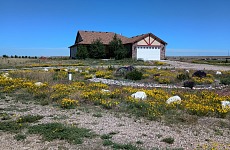 |
| During my visit to Europe everything at home set to bloom. |
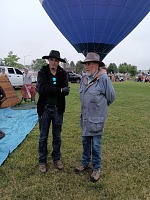 |
| There was no flying on the first day of Frederick - but at least we've seen friends.. |
I looked forward to getting home and to rest, while my life returns to normal
tracks and everything would be rosy. Naturally, I was seriously wrong. Even
before my departure I got a message from Sid that on the day of our return,
our ballooning friends want to stop by our house, on their way to a rally in
Colorado. It rattled me a bit; I lived under the apprehension that
Frederick
in Flight was supposed to take place in the last week of June, and that we
would return practically in the middle of the month. Yet we were coming back on
Wednesday the 19th, and thus the next weekend was 22nd and 23rd, and the last
June weekend would be too close to 4th of July, hence Frederick was happening
truly "right after our arrival". Fortunately Jeanne and Tom had had
a sponsored local hotel room and we agreed that we would simply see each other
in Frederick.
I told myself that ballooning with a jet lag would not have to be as bad, since
we would be up early anyway, and so won't let it go waste. On Friday I drove
to Frederick with Tom (Sid meanwhile going to work) — and there was no
flying due to low clouds. At least we go to see our friends and the ballooning
community. I had an afternoon shift that day, and on Saturday, Sid and Tom drove
out while I slept off my night shift. Finally on Sunday we all went, flying was
on, and it all ended up nicely when our balloon landed at a ranch where owners
welcomed us enthusiastically and helped us pack the balloons — news about
friendly ranchers quickly spread over radio and in the end a whole array of
balloons landed on their property.
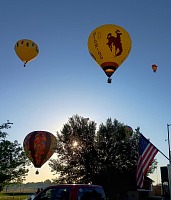 |
| Finally Sunday offered a flying weather. |
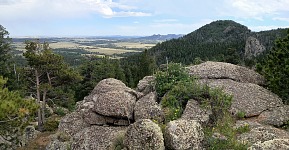 |
| It does not look it, but this view is from 4,000 feet higher than where we'd been in the Alps. |
Thereafter I went — back to work — and it started to show that
ballooning with a jet lag isn't a good combination, as long as you also combine
it with evening shifts in a restaurant. The result was that I could not sleep
almost at all and felt really unwell. Then the homestead awaited me. I don't
really know what to call it — we don't own a ranch (absent horses and
cattle), it's not a farm either (as in, we would grow something on a large
scale), hence a little homestead. True, this year we have baby goats and milk,
but our chickens are getting old and egg production calls for no celebration.
I think that my next flock will consist of Ameraucanas — Sasha and Rosie
don't lay a lot, but their eggs are still of good quality and pretty, while the
chickens themselves look nice and healthy. Other hens have problems with eggs
— I find some with no shells or deformed, while the chicks look pretty
worn-out. After all, the egg-laying breeds are selected to lay a lot and
quickly, and after that they go straight into the freezer. They are lucky with
me, for I am such a hipster and keep them on despite their low yield —
actually, I had obtained the chickens to be companions for my goaties and to
control bugs and grubs around the shed — that way, they still deliver
some work. Still, for my kind of homesteading, Ameraucanas seem to me being the
better choice — there are fewer eggs, but more regularly, and chickens
live longer lives and stay healthier.
I must think these things through with the homestead — for it's
"mine" — Sid with his daily commute to Colorado does not have
the time and inclination, and Tom with Lisa live mostly in Laramie at their
university, therefore much of the work and worries are mine alone. Somewhere I
encountered an article by an elderly Australian, who recalled his growing up
between world wars on a ranch, where their whole family toiled from sunrise
to dark — just to stay alive. Change came with mechanization and power
farming — they suddenly managed to till and cover so much, they had
excess — for which they got the machines and fuel, but even sometimes
a luxury.
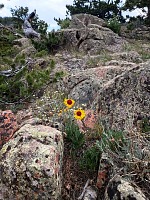 |
| At these elevations, flowers must be rather durable. |
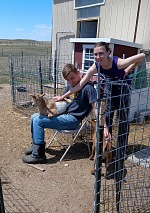 |
| Homestead is mine — only sometimes my helpers gather in greater number. |
My homestead does not have to (and could not) keep us alive — and so it's
a kind of balancing on the edge of what can be accomplished by one person
without mechanization, while said person remains merely exhausted but undamaged
— and not completely consumed by it, while the whole system does not fall
apart. So that trees and bushes remain watered and mulched, goats fed and their
hooves trimmed, compost mixed, eggs collected, shed and coop mucked out, feed mixed,
hay separated, front yard mildly weeded, prairie along the driveway mowed...
always something. I tried to pass some of my duties to others this year —
and purchased five hundred ladybugs to battle aphids. I was a bit worried about
the ladybugs, our ants are very aggressive, but even after four months I keep
finding ladybugs on our property and it seems that the aphids are a bit more
decimated this year. But that could be caused by a hot, dry summer. I had to
start regularly feed my goaties with hay in July (on previous years they got
hay only in the evening when I was closing them in the shed), as our prairie
had dried and yellowed up — it seemed to me that the goats could not find
much to eat there, and I also did not want them to overgraze it into a desert.
Buying hay represents expenses, which requires money to be made, and that means
going to work, simply running in a circle.
Right the week following our arrival, an unpleasant visit to the veterinarian
clinic awaited us. Ozzy and Rory have reached their fertile age (yes, with baby
goats it's around eight weeks), and since they won't be breeding billy goats,
we had to arrange their castration. Vets also promised another attempt to burn
off their horns — which eventually succeeded with Ozzy (it was his third
attempt), but not with Rory. I must accept that I will have one horned goat.
It's a hard choice, with horns and baby goats. Horns are much supplied with
blood and serve, besides defense, mostly as a heat-sink. All that makes sense.
However, with goats kept in domestic, fenced conditions, horns also represent
a complication — because they are so well irrigated with blood, in case
a goat gets stuck by its horns somewhere (and yes, goats use their horns to
butt fences and other obstacles), and the horn breaks off, the goat can bleed
to death. Moreover, Nigerians grow their horns mostly straight up — thus
becoming a real dangerous weapon, a kind of lance, permitting the goat to impale
other animals including humans. For this reason a horned goat is practically
impossible to sell, as nobody wants to have an animal at home with potential
complications. Rory will most likely stay with me and I will have to cope with
it. When he showed signs of using the horns to dominate other goats (including
his poor mother), I had to dispense a proper goat lesson about butting. I've
seen Twilight deliver it, when she ran down a cheeky billy goat Willy, knocking
him to the ground. When Rory tried to hit me with his horns, he got the same
lesson. I object to violence against animals, but it seems to me better to
let him learn it early instead of me having to cope for the rest of his life
with HIS aggression. He seemed to understand — and not taking it
personally — he still approaches me for treats and scratching, and he even
comes to pick up his harness — I teach the boys to wear it; I have
a vague plan that they could walk with me on hikes. A goat can carry up to about
a third of its weight, and each could thus shoulder twenty two pounds —
and that could be useful. Rory's horns could be an advantage in the nature
— he would look like a combat goat and could deter small predators, like
coyotes.
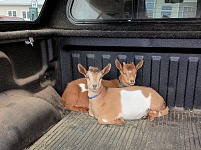 |
| Ozzy and Rory going to the vet. |
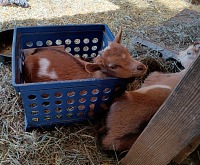 |
| Rory will be a horned goat, but we hope he will stay as cute as he is now. |
A bit of drama happened with Ozzy and his little horns; one burnt-off horn broke
off — and Ozzy bled like crazy. There was a pool of blood in the shed and
Ozzy's face had blood all over, apparently it was a flood. We found him when it
abated a little, but even so I called the vets to ask what to do. They said to
do nothing, just prevent him to butt other goats. We separated Ozzy, Rory and
their mother Bonnie from the rest of the herd so that they get some quiet, and
then Tom and I tried to wash Ozzy of the dried blood. I had Ozzy on my lap and
Tom kept cleaning — suddenly Ozzy's head began to fall, which scared us
again — was he dying? Oh no, he only needed a nap. After some while he
bounced off my legs with a verve that I had bruises, and demanded food. But
since that time Ozzy comes sometimes to me to sleep — which with his
gaining size and weight starts to be a bit of a problem. Rory is more bashful
and less assertive, but keeps coming for a scratch — so I hope he will
keep that way, now that he's a horned goat, he could stay cuddly.
But back to June — a week after arriving from Europe, Tom and I were
driving during a sunset, back from a ballooning meeting. Our county road turns
almost hundred eighty degrees on a berm around a flood meadow, so one first
goes toward the setting sun, and then along a long curve, where various trees
line a creek. A rather large car drove in the opposite direction, and I kept my
eye on it, when suddenly something large and brown hit my windshield. In the
first moment my head concluded that the guy in that car had thrown something at
us, in the next second my head realized that it could not be as we had not
passed the car yet. In the third second Tom screamed at me to stop, it was a
deer. I stopped, Tom went to check our car (smashed front) and the deer (dead).
When we managed to lift the crumpled hood, various plastic pieces fell on us
including the wiper liquid tank — but nothing leaked nor looked broken
inside. Given the fact that the left front side was in pieces, I consider it
a design success. Tom took a number from the opposite driving chap (who,
naturally, had stopped — not just him; people stop here and offer help),
in case we needed a witness. Then we slinked home. It seemed to me that even
wheel aligment did not suffer — the car did not lurch (although,
with an all-wheel drive it might not be as obvious), the engine made no strange
sounds and the dashboard did not report any disaster.
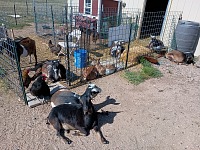 |
| All my animals — five chickens and nine goats. |
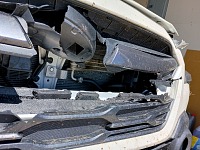 |
| Smashed car. |
James was at our home and promised to stop at the spot on his way out and to
check out the deer — he's a hunter and I was hoping that he could kill
the potentially alive and hurt animal — but he did not find it —
apparently someone had frugally taken the deer home to freeze. I was surprised
by the speed, it took less than an hour.
Besides feeling stupid for killing a deer, much long-term hassle awaited me with
the insurance and the repair shop. First how to explain to the insurance that
the fact that I DROVE the car home did not mean it's "only scratched"
and otherwise operational (I lost both headlights, and the fender and hood
attachments were questionable). More uncertainties ensued regarding WHEN the
repair shop would have time to deal with it. We mostly enjoy the slow pace of
a country life, but I was shocked by discover that it would take ten days (as
the subsequent week was the Fourth of July, when no-one works). Then the very
fact of someone finally ASSESSING the car did not mean that it would get fixed.
To spare you the suspense — I got my car back mere five weeks after the
accident.
Those five weeks were very stressful for me — my affiliate goat lady has
defined it that here, a car is actually a woman's handbag — and she's right.
I carry in my car, beside Wyomese necessities like a blanket, an ice scraper,
and a shovel, also things like spare contact lenses, spare glasses, a knife,
a spoon, a lip balm, a sunscreen, slippers, a windbreakers, a wooly hat,
a spare sweatshirt, Ventoline and some pills, a tire compressor, water,
emergency food, state and national parks/forest permits, and in winter also
skis and winter clothing; simply the few things one can find handy when one
gets stuck somewhere outside a cell signal and/or in a snowstorm or a road
closure. Thanks to our sparse population, our road network is equally sparse,
and when they close your route, there's no escape.
Without my car I was like without a hand. I found myself at work lacking my
reading glasses (I had to quickly go and buy another pair), at climbing gym
without my Ventoline (so I could hardly breathe), and I continually kept looking
for something. After all, I'm an elderly (scatter-brained) person, who leads
a very complicated life — and I need specific clothes and equipment for
work, and quite different ones outdoors; others for shopping in town, and
different ones when climbing at the gym. Tom had his school break and stayed
"at home" (Lisa spent her summer in Laramie, where she worked at
the State Veterinary Lab); we had plenty of cars, but none of them was
"mine" — I kept carrying bags and purses hither and thither,
and still something was missing all the time, whilst we kept on organizing who
would take which car, and where and when it would be back.
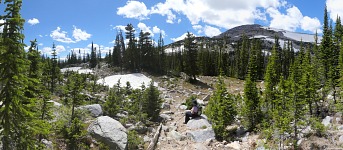 |
| From worries and work, we escape to the mountains. |
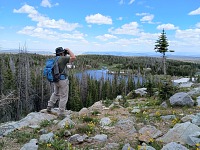 |
| Sid taking a picture of Telephone Lake. |
In the beginning I tried to rent a car — insurance was supposed to cover
the cost, but as it tends to go, they pay the rental but not the insurance for
it, which was twenty five dollars a day, but without which the rental company
always finds something to charge you extra. It does not seem much, but with my
outlook of a long-term rental, it would still set us back. The rental
car was Nissan Rogue — admittedly, it drove well, it had a great turning
rate and overall it felt very close to a Subaru. Yet its modern amenities
irritated me to no end. Once I was driving home after dark, in a storm, and
water had clogged its front sensor — and the car began to beep, following
with a TWO-PAGE description flashing on the dashboard (preventing me from seeing
the speedometer and similar excessive details), announcing that the sensor was
gone and that I ought to stop and consult the User's Manual. When the
announcements had finally given up, it collapsed into a blinking orange light on
the dashboard — exactly when you're trying to see in the dark, through the
streams of water, a flashing orange warning is very distracting. Similarly, with
every turning on, but also with every change in windshield wipers' speed, the
car provided a detailed advice on how to use the relevant wiper switch —
obliterating other information on the dashboard. I don't know; it is forbidden
to text while driving, because it distracts the driver — but is it OK to
distract the driver, when the car does it? In the end I was glad to return the
car, as I was worried that it would shock me to the point of having another
accident.
At that time we had a veterinarian appointment for our cats. Since they
fervently bring home various vermin, and we subsequently find gall bladders and
intestines, but also rabbit ears in the basement, we feel it healthier to have
the boys inoculated against rabies and similar delicacies. There is no problem
with Hugo, but Guido is not exactly a typical cat — he had lived substantial
part of his life as semi-feral, barn cat, where he had to take care of himself.
He's apparently deaf, and though he allows us to comb and pet him, any attempt
of ours to lift or hold him causes a panic attack, in which he defends himself
heedlessly, and then runs — even at the price of colliding with walls and
so forth. And as expected — loading Hugo into a crate was a child's play,
but Tom and I kept chasing totally desperate Guido for about half an hour.
When he could not run any more and was hyperventilating, Tom finally caught him
in the bathroom by simply grabbing him by the scruff of the neck and lifting
him up.
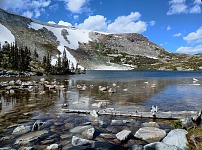 |
| Lost Lake. |
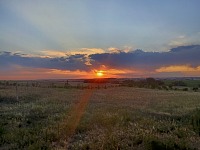 |
| Our typical sunset. |
However, on our way to the vet's Guido kept hyperventilating — with an
open mouth and wheezing and huffing horribly. I burst into the office asking
them to get Guido right away, for I was worried he could have a heart attack
(I don't know, can cats get a heart attack?). The vet checked Guido out and
said that he was just being a diva and making a scene, but there was nothing
wrong with him. Still, Guido was not cooperating to be handled, and thus he
received all shots in the cage. Hugo, on he other hand, was an exemplary patient
who allowed to be listened to, checked for teeth status, and did not protest
at all.
When I relaxed, thinking that the worst drama was behind us, I just carried
Hugo back to the car when my phone rang. The number was our County Court, so I
had to pick it up. A recording said that I was to appear on Monday at the court
as a juror. I admit it almost smote me. And I also got immensely pissed-off.
I had got a letter from the court in February that I would be called to jury
duty during summer. I wrote back with an explanation that I can't go to court
during summer, as I have a homestead and expect baby goats, who need intensive
care, and I can't disappear from the house for ten hours in one stretch every
day — and I pleaded to have the duty switched to winter season, when there
is less work. They wrote back that I was excused till mid July — and then
they summoned me right the first day. Me with no car, in the middle of summer
farming season, on a dry year, when I must water besides by vegetable plot also
those approx. three hundred trees (of which about 200 have irrigation installed
— which still somebody must turn on and off, and most importantly, watch
for disconnected hoses — while the rest is scattered around the property,
so I keep dragging buckets). Ozzy and Rory were twelve weeks old, so I began
to start milking Bonnie, which meant getting up early in the morning. Besides
that, we had planned a trip to Riverton for the upcoming weekend, and I also
promised mine, goats' and chickens' presence in Cheyenne Day. I started to count
how many hours in the day I will have left to sleep, when I spend eight hours
at the court, another ninety minutes go to commuting there and back and parking
in down-town; four to five hours are needed to take care of the property, and
no one would excuse me from weekend shifts at work — it added up to some
ninety work hours per week. The only hope I had left was that they might NOT
select me for the jury.


















